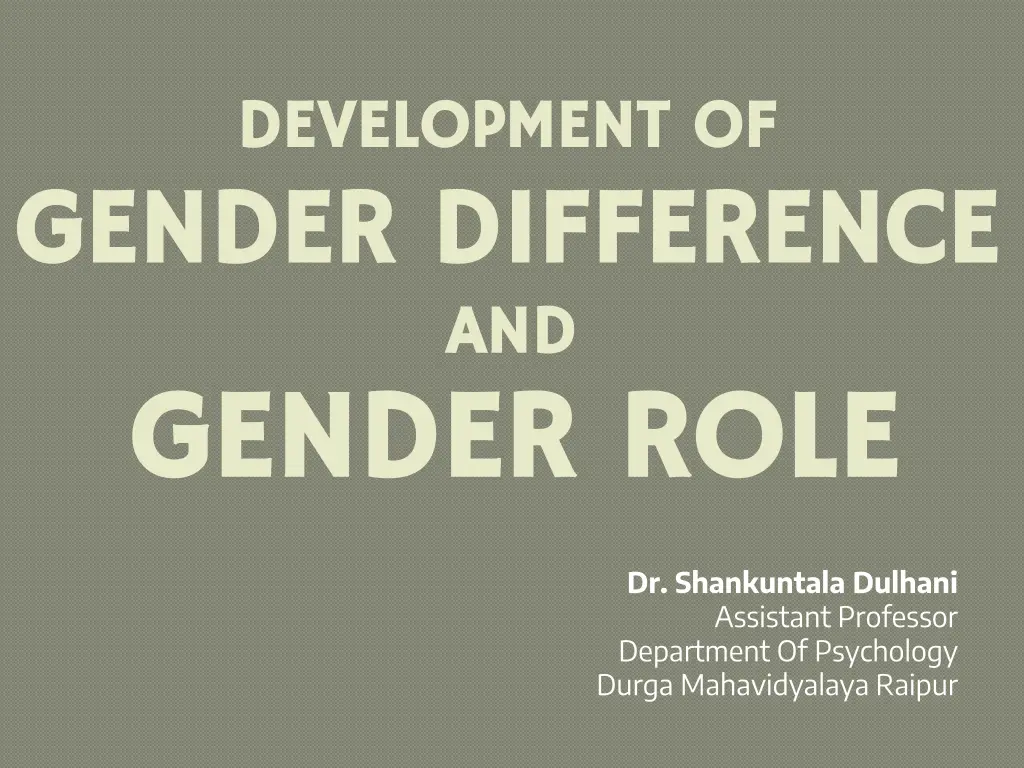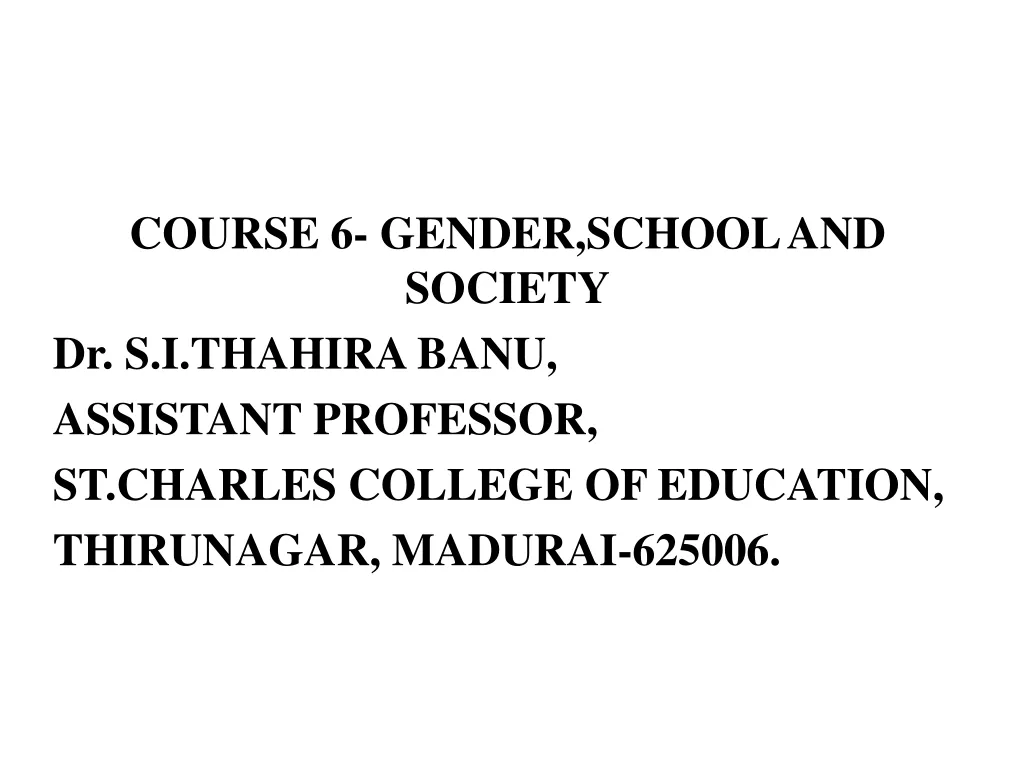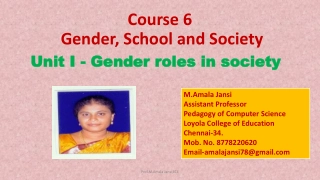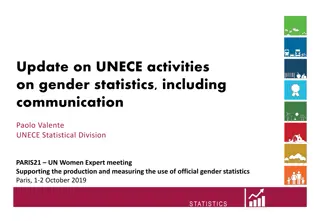
Understanding Gender Differences and Gender Roles: Insights from Psychology
Explore the development of gender differences, gender roles, and their impact on cognitive, social, emotional aspects, and more. Discover how males and females vary in cognitive achievements, social interactions, emotional expression, self-esteem, and preferences. Gain insights into the complexities of gender identity and its influence on behavior and cognition.
Download Presentation

Please find below an Image/Link to download the presentation.
The content on the website is provided AS IS for your information and personal use only. It may not be sold, licensed, or shared on other websites without obtaining consent from the author. If you encounter any issues during the download, it is possible that the publisher has removed the file from their server.
You are allowed to download the files provided on this website for personal or commercial use, subject to the condition that they are used lawfully. All files are the property of their respective owners.
The content on the website is provided AS IS for your information and personal use only. It may not be sold, licensed, or shared on other websites without obtaining consent from the author.
E N D
Presentation Transcript
DEVELOPMENT OF DEVELOPMENT OF GENDER DIFFERENCE GENDER DIFFERENCE AND AND GENDER ROLE GENDER ROLE Dr. Shankuntala Dulhani Assistant Professor Department Of Psychology Durga Mahavidyalaya Raipur
Paper II (A) B.A. PART 3
The word sex describes the body. Sex organs and sex chromosomes show what sex someone is. The word gender describes someone s personality or character. It says if someone feels or acts more like a female (feminine) or more like male (masculine)
Gender differences are variance between males and females that are based on biological adaptation that are the same for both sexes. Gender differences are driven by differing environmental factors that affect our cognition and behavior.
(1)Cognitive and Intellectual Achievement:- However male and females do not differ in general intelligence, but they do have difference in mathematics, verbal performance and spatial rotation skills and academic performance.
(2) Social and Personality difference:- Few differences in personality arise between boys and girls. Some believe that boys are more physically active than girls. Boys are more rough and tumble players whereas girls seem to prefer smooth social interactions with each other.
(3)Emotional differences:- Females in comparison with their male counterparts may be more emotionally expressive, shameful, envious and helpless and experience and empress less anger and guilt.
(4) Self esteem:- Self esteem refers to highly an individual evaluates oneself . Males have slightly higher self esteem than females (5) Preferences:- There are different preferences of toys are seen in baby girls and boys. Girls like to play with dolls and kitchen sets where as boys like to play with trucks and constructive sets. Boys prefer to play more than girls
(1)Biological Theories:- According to biological theories psychological and behavioral gender differences between male and females. In this approach researchers have focused on historical explanation such as evolutionary processes and proximal explanations such as genes and sex hormones.
(2)Socialization Theory:- Socialization theories of gender development view gender differences as by product of the differential treatment girls and boys receive from the people in their lives and the pervasive gender stereotyped messages that children are exposed to their environment.
(3)Cognitive Theory:- Cognitive theories of gender development view children as active constructions of knowledge who seek, interpret and act on information in an effort to match their behavior to their understanding of gender.
Major theories of gender role development:- (I)Freud (i)Ages 3 to 5 children feel sexually attracted to their other sex parent. (ii)Ages 5 to 6 children feel guilty and anxiety over their attraction (iii)Connection with same sex parent is crucial to long term mental health and sex derive.
(II)Erikson:- (i)An extension of freud s theeory (ii)Based on sexual differences between men and women to explain psychological differences (iii)Due to differing genital structures males more intrusive and aggressive and female more inclusive and passive.
(1)Emphasis on the power of the immediate situation and observable behavior. (2)Two ways children learn their gender roles (i)receive rewards or punishments (ii)watch and imitate the behavior og others (3)Belief that children imitate the same sex parent (4)Does not believe that child feel guilt or anxiety over a supposed attraction to the other sex parent. (5)Socialization of children is one of the major causes of gender differences between boys and girls (6)Children are encouraged to do the appropriate sex typed activities by the following (i)parents (ii)media (iii)schools
(1)Children own cognitions are primarily responsible for gender development (2)Kohlberg (i)children identify with and imitate same sex parents and other of their same gender (ii)after children label themselves as male and female the development of gender related interests and behavior quickly follow.
(1)Theory suggests that children: (i)Use gender as a schema to organise and guide their view of the world (ii)Acquire gender specific behaviors through social learning (iii)Own thought processes encourage gender development. (2)A combination of the social- learning and cognitive development approaches all are humans our body have sexual desires and to share sexual intimacy we need a partner with whom we can share it .
Human a social animal he / she needs some one with whom he or she can share love, care, laughter, joy of lives. In life after some phases everyone leaves you at that point of time you need a partner to share your life with. Marriage provides the life long partner
Some of the psychological needs are certainty significance and love/ connection are essential for human survival. Need of life long love certainty and significance can only be fulfilled by the person who are close to you or basically care for you.
THANK THANK YOU! YOU!






















